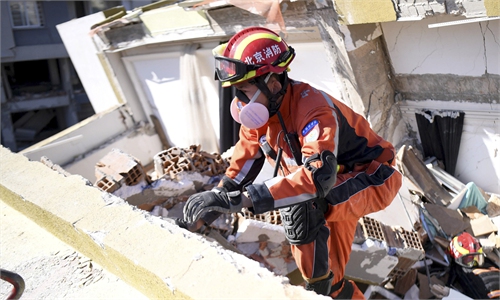Heavy causalities in Turkey-Syria earthquakes highlights urgency, necessity of global early warning system: leading Chinese scientist

An aerial view shows collapsed buildings in Hatay, Turkey on February 7, 2023 after a 7.8-magnitude earthquake and strong aftershocks jolted Turkey and neighboring Syria the previous day. More than 5,000 were killed and more were injured as of press time. Photo: VCG
The combined death toll caused by earthquakes in Turkey and Syria has exceeded 41,000 as of press time and may further climb as many people remained buried under rubble. The disaster highlighted the necessity and urgency of establishing a global warning system on earthquake as it could help earn several to dozens of seconds for local residents and save tens of thousands of lives, Wang Tun, head of the Chengdu-based Institute of Care-life, a key earthquake early warning laboratory in Chengdu of China's Sichuan Province, told the Global Times in an exclusive interview.
As of press time, the death toll in Turkey has reached 35,418 and 5,800 in Syria - these figures came over a week after the deadly earthquakes which the World Health Organization described as the worst natural disaster in 100 years.
Wang, who developed an earthquake early warning (EEW) system in China, said that the disaster is a reminder to all governments in the world on the significance of setting a global network on early warning. China, with its experience in building world-leading EEW, can share the international community with its experience and technologies.
"With an early warning of several seconds to 60 seconds, the death toll in an earthquake can be reduced by 30 percent," Wang said, noting that if China had set such a system before the Wenchuan earthquake, Beichuan, a severely-hit county, would have been afforded an extra 31 seconds of "live-saving" time meaning the total death could be reduced by 20,000 to 30,000 and more than 20,000 heartbroken families could avoid the pain of losing family members.
The devastating Wenchuan earthquake which struck in May 2008, left more than 80,000 dead or missing. The grievous scenes of the earthquake drove Wang to come back to China to devote to establishing the country's early warning system.
"The international community came to aid Wenchuan after earthquake jolted it and helped with the aftershock construction. It is time for us to help with other countries and the world with more efficient, low-cost and reliable approach on earthquake early warnings," Wang said.
According to Wang, after the Wenchuan earthquake, China has focused on developing early warning technologies and has set the world's largest earthquake early warning system which has the fastest speed and the most accuracy. It covers 90 percent of the population in earthquake-prone areas.
China's real-time monitoring system can capture seismic signals as soon as possible and provide early warnings released through mobile phones, TV, radio and new media. A total of 800 million televisions and cellphones have already installed the earthquake early warning function, said Wang.
China is willing to share advanced technologies with other countries, which is also in response to the UN's call on establishing global EEW systems, said Wang.
China is the third country after Japan and Mexico to boast such an advanced level of earthquake warning ability.
The Sendai Framework for Disaster Risk Reduction 2015-2030, which was adopted at the Third UN World Conference in Sendai, Japan in 2015, recognized the need to increase the availability of, and access to, multi-hazard early warning systems and disaster risk information and assessments to the people by 2030 as one of its global targets.
The United Nations Educational, Scientific and Cultural Organization (UNESCO) has been very active in promoting international cooperation, scientific knowledge exchange and capacity building for the development and implementation of geo-hazard early warning systems worldwide, including earthquakes.
However, it is not an easy task to promote a global network on early warning system of earthquake as some countries may hold on fluke mentality and it is also not easy to advance developments on early warning to sudden-onset hazards such as earthquakes, Wang said.
Earthquakes may hit not only one country and without a unified global early warning system, parameters offered by system in each country may not be accurate enough to offer timely warning, said Wang, suggesting UN's related agencies to promote more exchanges on technologies and experiences in order to set an global early warning system.
China has already worked with neighboring and regional countries in setting their early warning systems. For example, after a 7.8-magnitude earthquake hit Nepal in 2015, the Institute of Care-Life and the Nepal Academy of Science and Technology announced to build early warning systems in Nepal. Since its operation in 2020, the system had provided warnings to nearly 10 above-5-manitude earthquakes.
The systems in China and in Nepal can also serve for each other. Indonesia is also working with China in building the early warning systems, said Wang, noting that China is doing what it can to promote the global security and developments.



